The Vale of Glamorgan Festival celebrates its 50th anniversary this year. It has become an exemplar for excellence and innovation in the performance of music by composers who are alive and active. Nigel Jarrett interviews founder and artistic director John Metcalf and looks at some of the events he’s planned this year.
It’s not off-beam to conclude that the music of composers long dead attracts the bigger concert audiences in the West, to the extent that to be alive and composing confers a disadvantage only slightly offset by being living and white. The music referred to in this context, of course, is that which continues in the so-called ‘Classical’ vein, as opposed to what is immediately popular and commercial (rock and pop) and making its appeal to audiences in the mass. That the former is referred to as ‘contemporary’ or ‘modern’ suggests an immediacy not always reflected in the waves of approval given to the latter. A dead, white composer of classical music might even be ‘modern’ but he (much less often she) is more likely in the minds of concert audiences to have been writing music before 1900.
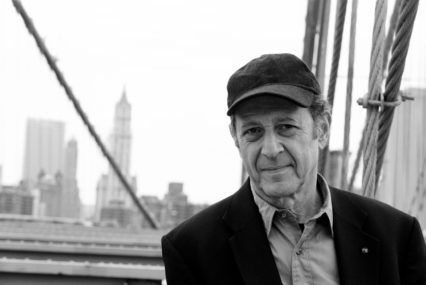
Photo Credit: Jeffery Herman
These myriad distinctions are readily understood by the composer John Metcalf, who this year celebrates fifty years as the founder and artistic director of the Vale of Glamorgan Festival, an established international banner-waver for contemporary, and these days living, composers. This year’s event takes place at venues in Cardiff and the Vale between May 18 and 24. Headline concerts will include the Wales première of Steve Reich’s Music for Ensemble and Orchestra, a world first for Metcalf’s new version of the Polly Garter Aria from his operatic version of Dylan Thomas’s Under Milk Wood, a festival commission from Mark David Boden (Descent for orchestra) performed by the BBC National Orchestra of Wales, and a solo performance from Graham Fitkin to include a couple of new works for prepared piano. One European première and one world première by American composer Ben Wallace will also be heard. Reich, the superstar American minimalist, is the festival’s 50th anniversary patron.
There will also be performances by Sandbox Percussion, from New York, playing on an unconventional assortment of ‘instruments’, including plant pots and wine glasses. Among other special 50th commissions will be ones from from ten composers – eight Welsh – for short pieces to be performed by Astrid the Dutch Street Organ (operated by Francis Stapleton). Reich’s Different Trains and a new work by Cardiff-based composer Robert Fokkens will be performed by Berlin-based award-winners the Armida String Quartet.
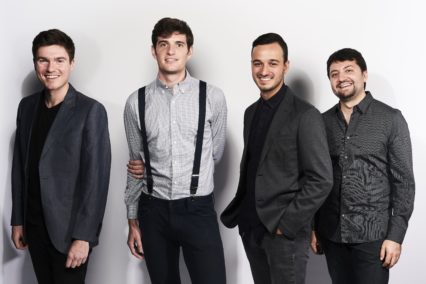
Contemporary music often appears embattled yet the response to the Vale of Glamorgan festival always seems to be positive, supportive, and enthusiastic. Metcalf gives the festival’s audiences credit for that.
‘Certainly, the nature of our artistic policy leads us at times towards some of the more audience-friendly reaches of contemporary music,’ he said. ‘That’s because our aim is to reconnect both the general, intelligent listener and the specialist, with the ongoing evolution of musical repertoire. Our belief, however, is that it is not imitation but challenge that is the sincerest form of flattery. So all our concerts feature works that, in different ways, aim to extend the normal range of the listener’s expectations and experience.’
The choice of music to reflect this was therefore important for a festival whose declared aim was to ‘put the composer first’ as pat of its attempt to re-connect with the listener.
‘As with all curatorial roles, the responsibility is to make judicious choices and I try to bring all my knowledge, background and experience to those choices,’ Metcalf said. ‘More than many classical music organisations, we operate on a “repertoire first” basis. This sounds obvious. However, for every e-mail in my inbox offering the work or works of a specific composer, there are ten offering soloists or ensembles who are touring in a particular season. The repertoire they are playing is often a secondary feature. The creation of new work is the foundation of music. No architect designs a building from the first floor up. As many other vibrant art forms testify, there is sense in planning the choice of repertoire first, then the performers and circumstance most suited to presenting it to a wide audience.
‘Diversity is hugely important and is best achieved by a range of choices. There are probably thousands of music festivals of various types across the UK. If they all made even more distinctive choices, the resultant mix would have its own immediate validity. Objectivity, like diversity, actually comes from below. Like critical mass it is hard to ordain from above.’
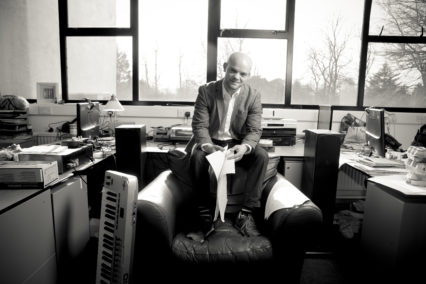
This year, works by 19 Welsh composers will be heard, even though Metcalf described the Festival as ‘resolutely internationalist, throwing open a window to the world’. Presentation of new work in any art form and however occasioned was much more than a duty, he explained; but the Vale of Glamorgan Festival had always taken a leading role in promoting Welsh music – that was to say, music by native Welsh composers or those who had made their homes here. Among these represented in the 50th, in addition to Metcalf himself and Boden, will be Charlie Barber, Steph Power, Lynne Plowman, Guto Pryden Puw, Gareth Glyn, Fokkens, Claire Victoria Roberts, David Roche, Brian Noyes, and Andrew Wilson-Dickson.
The international scope Metcalf refers to reflects changes in the centres of important compositional practice, hitherto geographical, which, he believed, were related to the development of information technology.
‘It’s had a huge effect on musical culture and is one part of the change that in this field has seen a shift from an almost exclusively male, primarily Germanic, culture at the end of the 19th century to what we have today.’ he said. ‘A further aspect of that shift has been to make stylistic and other developments more quickly available, diminishing, though not replacing, the need to travel to specific centres to witness the latest trends – a move that environmental concerns will surely only accentuate. This has and will lead to greater diversification. Our intention is that the festival should reflect not only what has happened previously elsewhere but be part of the conversation about where music is going.’
That direction and development had so far been a more-or-less straight line. Metcalf believed the line to be now broader and more of a ‘wave’. He said there would always be pinnacles of achievement in the arts as elsewhere and, though sometimes bewildering, it was a strength that greatly increased numbers of people – in classical music notably, but not exclusively, women – had the opportunity to aspire to creative work at the highest level. There were still ‘firsts among equals’ but the competition was now more numerous and more accomplished.
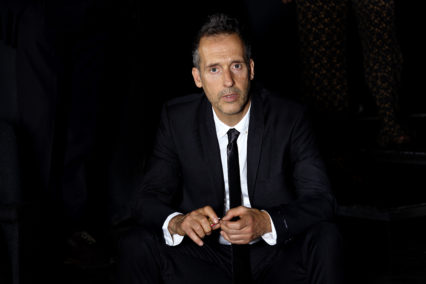
But this change had not been accompanied by the development of a similar plethora of critical platforms that provided the opportunity to discuss creative work. Art work, he said, would always attract strong viewpoints and the desire to evaluate and make comparative assessments would never decrease. Bizarrely, as the numbers of those creating work had increased exponentially, the range and variety of critical opportunities had, to our detriment, decreased.
Festivals as long-established as Vale of Glamorgan do not survive on fresh air and enthusiasm alone. Enthusiasm for marshalling financial support, yes. But Metcalf said it was a truism of arts funding that the call for imaginative and radical change was almost always loudest at a time of contraction of support.
‘Salt for that wound is currently provided by the tired oxymoron that less means more,’ he said. ”Less may be justifiable (it may!), but it is not more. Public services are not improved by cutting funding, increasing requirements and hoping for the best. The positive side is the resilience, idealism and inventiveness of those working in the arts. But there are circumstances – like the recent 66% cut in support for instrumental music teaching in Ceredigion – where even that may be insufficient. Less is not more, but enough is enough.’
Metcalf was just 23 when he put put together the programme for the first festival in 1969. There was no full-strength national symphony orchestra in Wales and no purpose-built concert hall in the capital. Welsh National Opera was a year away from having its own professional orchestra (there were even amateur singers in the chorus until 1973). Swansea, and Llandaff in Cardiff, held music festivals. These were traditional in structure and function. But the Vale of Glamorgan Festival was innovative from the start: it presented music in unusual venues and pioneered commercial sponsorship and the commissioning of small-scale opera. This last ultimately prepared the ground for Music Theatre Wales, now a world-class company.
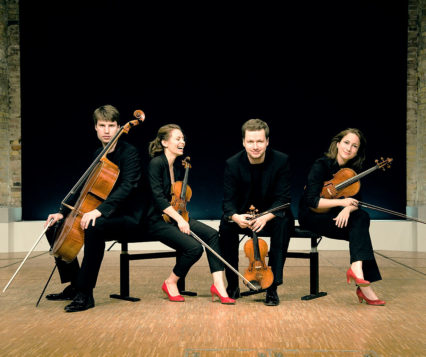
From 1986, Metcalf was based as composer and artistic director at the Banff Centre in Canada, leaving associate artistic director David Ambrose in charge of day-to-day planning and programming back home. He returned to Wales in 1991 to resume full-time control of Vale of Glamorgan Festival. ‘The language of contemporary music had by then broadened … to reach potentially a wider public,’ he said. ‘So, we decided to focus exclusively on the music of living composers.’
Thus did the festival enter its golden period, with world-renowned composers such as Reich, Arvo Pärt, and Louis Andriessen in attendance for celebrations of their work. In 1994, Vale of Glamorgan Festival received the ultimate UK arts accolade, the Prudential Award.
What of the future?
‘I hope we will advocate even more adventurous programming’ he said. ‘There is no funding available for organisations like ours simply to exist, so the response to more straitened times must be to be even bolder. Hard choices are now routinely made and only the most compelling work, delivered to the highest professional standards can achieve support. Where we can, our aim must be to raise expectations.’
Vale of Glamorgan Festival 50th Anniversary 2019 in detail:
Saturday May 18
Glanfa Stage, Wales Millennium Centre, Cardiff CF10 5AL
11am Free Event: Astrid the Dutch Street Organ (operator Francis Stapleton).
World premières of ten short works commissioned or arranged for the instrument, by Charlie Barber, Mark David Boden, Graham Fitkin, Gareth Glyn, Lynne Plowman, Steph Power, Guto Pryden Puw, Claire Victoria Roberts, David Roche and Ben Wallace.
BBC Hoddinott Hall, Wales Millennium Centre
6.30pm Pre-concert talk on the 50th Anniversary of the Vale of Glamorgan Festival –
‘New Music in Wales, Then and Now’.
7.30pm BBC National Orchestra of Wales.
The concert will feature a Vale of Glamorgan Festival commission from Mark David Boden (Descent), the Wales première of Steve Reich’s Music for Ensemble and Orchestra; a world première arrangement of John Metcalf’s Polly Garter Aria for soprano and orchestra, in which violinist Tamsin Waley-Cohen and soprano Elizabeth Donovan will feature; and Graham Fitkin’s celebratory work Metal, for orchestra and un-tuned scaffolding. Music also by Dobrinka Tabakova, David Lang, and Peteris Vasks – and the the European première of Ben Wallace’s Five Gifts for an Old Friend. The conductor will be 29-year-old American Ryan Bancroft, who won the £20,000 first prize and the audience prize at the Malko Competition for Young Conductors in Copenhagen in 2018. Tamsin Waley-Cohen will also perform in the Vasks work.
Box Office: 0333 666 3366
Tickets £16.50, students £3
Sunday May 19
St Fagans, Penarth, Barry
Astrid the Dutch Street Organ will be out and about at the following venues:
Morning – St.Fagans National Museum of History
Lunchtime – Penarth Pier Pavilion
Afternoon – Barry Island Eastern Shelter
Outdoor performances will be weather-dependent, so please check on the festival’s Facebook page for more details and updates both before and on the day @vogmusicfest
Astrid and Stapleton will be visiting Aberystwyth and Bangor later in the year.
5.45pm Outside National Museum, Cardiff Vale of Glamorgan Festival
New Music Mystery Tour.
A thirty-minute tour with composers talking about their music, which will be heard at a concert at an atmospheric, intimate secret venue.
Box Office: 0333 666 3366.
Tickets £17.50. Picnics £13.95
Monday May 20
Ty Cerdd Studio, Wales Millennium Centre
7pm Composer Spotlights.
Composers Brian Noyes and Andrew Wilson-Dickson in discussion with John Metcalf on what inspires and challenges composers when they are creating new music, followed by premières of their works. Noyes’s Piano Trio Op.38 was inspired by time spent with the composer Sir Peter Maxwell Davies, and Wilson-Dickson’s Piano Trio No.2 by ancient British bell-ringing techniques. The concert will feature pianist Robin Green, violinist Sara Trickey, and cellist Rosie Biss.
Box Office: 0333 666 3366
Tickets: £8 in advance, £10 on the door
Tuesday May 21
St David’s Hall, Cardiff
11am Schools Performance.
Sandbox Percussion from New York and Astrid the Dutch Street Organ, with presenter and music project director Helen Woods, in a performance for children and their parents, opening with a presentation of songs written and performed by primary school-children from South Wales.
This is a Vale of Glamorgan Festival project in partnership with Arts Active, with funding support from the Arts Council Wales, Vale of Glamorgan Council, and Tŷ Cerdd.
7.30pm Sandbox Percussion and Astrid the Dutch Street Organ.
Sandbox thrills with its energetic and flamboyant style of contemporary American music. The concert will feature the world première of a work by American composer Ben Wallace for street organ and percussion quartet.
Box Office: 02920 878 444
Tickets £14. Disabled £12.50, students & under 16s £5
Wednesday May 22
Ewenny Priory, Bridgend
6.30pm Pre-concert talk by Cardiff-based composer Robert Fokkens about his new work.
7.30pm Armida String Quartet.
Featuring the Fokkens première, and music of Azerbaijan, Tatar-Russia and Bulgaria.
Those keen to attend this concert but who find it difficult to get to the Priory can email vogfestival@outlook.com as Festival Friends may be able to help with transport.
Box Office: 0333 666 3366
Tickets £15, students £3
Thursday May 23
Cinema, Penarth Pier Pavilion CF64 3AT
7pm Pre-concert talk.
8pm Armida Quartet.
The music of Peteris Vasks and Arvo Pärt is presented alongside Different Trains, Steve Reich’s haunting comparison of the trains of his childhood and those used in the Holocaust.
Box Office: 0333 666 3366
Tickets £15, students £3
Friday May 24
Cardiff University School of Music, Corbett Rd, CF10 3EB.
9.30am Peter Reynolds Composers Studio. Free Event – Please email vogfestival@outlook.com to reserve a space.
Armida Quartet.
The Composers Studio is a residency for emerging composers with seminars, mentoring, composition, work-shops, recording with world-class artists and exposure to contemporary music from around the world. The week-long residency aims to fulfil the vital need to give the composers at the start of their careers the best possible circumstances in which to hone their skills and create genuine career progression. Peter Reynolds was a respected Welsh composer and teacher and a great supporter of the festival, where his music was performed.
Acapela Studio, Heol y Pentre, Pentyrch, Cardiff CF15 9QD.
7.15pm Pre-concert talk by composer Steph Power.
8pm 50th Anniversary Vale of Glamorgan Festival finale.
Graham Fitkin – The Composer Plays.
A rare opportunity to hear one of the UK’s foremost composers play his own music in a programme to include Resistances, Running and Breathing and two world premières for prepared piano.
Box Office: 02920 890862
Tickets: £16.50
The studio is a former church. Seating is a mixture of tables and chairs and seats in pews, all unreserved. The studio offers pre-concert dining between 6pm and 7.45pm from their wood burning pizza oven. All those seated at tables must buy a pizza. To book a table and tickets, please go online at www.valeofglamorganfestival.org.uk
Although there is disabled access, due to the intimate nature of the venue there is no disabled lavatory. Please contact the studio on 029 2089 0862 for further information.
Header photo: Vale of Glamorgan Festival founder and artistic director John Metcalf. Credit: Matthew Thistlewood


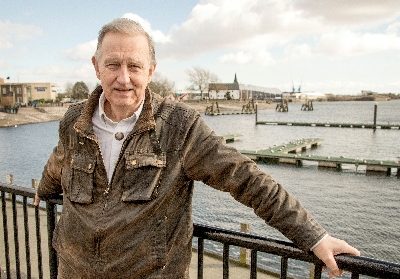
 Enjoyed this article? Support our writers directly by buying them a coffee and clicking this link.
Enjoyed this article? Support our writers directly by buying them a coffee and clicking this link.








